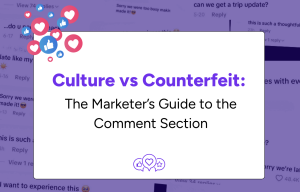
Culture vs. Counterfeit: The Marketer's Guide to the Comment Section
This guide, created by Cyabra and VaynerX, reveals how counterfeit culture is quietly influencing audience perception and distorting the insights marketers rely on most. Using real-world examples and Cyabra’s data-backed ABC Model, it provides a step-by-step framework to detect inauthentic behavior, measure genuine engagement, and make brand decisions based on truth, not noise.

